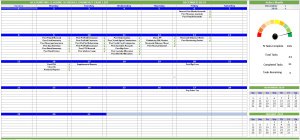
Productivity Tips Start the discussion!

What is productivity?
Productivity is a measure of the efficiency of a certain subject, whether that be a person, machine or a system. The level of productivity is a result of dividing average output per period by the total input in that same period. There are many reasons as to why productivity is so important for businesses, with a similar multitude of reasons as to how to increase it.
How important is productivity?
The ability to manage your work in an efficient way is an important skill to have for numerous purposes, some of which include:
Increasing profitability: Companies can experience an increase in profitability as the cost for producing their goods and services decreases. As productivity increases, so does efficiency and thus less labour is needed to produce the same amount of goods. A company could chose to reduce the amount of labour, however, by keeping the same levels of labour they will experience a higher level of output.
Optimising resources: Through better human resource management, a business can benefit from reduced costs and better efficiency. An organization can improve situations where an employee isn't reaching their maximum potential to therefore optimise their resources.
Reducing waste and environmental impact: Time, money and resources can be wasted through unproductivity. If you are unproductive, you will waste time on tasks that could be completed in shorter periods. Additionally, this wastes energy as employees are required to be in the office for longer, using more electricity than needed.
Reducing employee burnout and improving wellbeing: Working in a more efficient manner can reduce the stress of overburdened employees. This will, in turn, enhance the wellbeing of workers who are more in control of their jobs.
What are some methods to increase productivity?
Increase efficiency: This requires review of your work processes and task management in order to complete what is required.
Reduce distractions: By removing or reducing the things that lower focus, there is more encouragement to work at one's desk, therefore increasing productivity.
Have the right tools and equipment: When employees are provided with the right equipment needed to execute their jobs, less time is spent waiting on inefficient processes. A slow computer or slow printer, for example, could add significant time to a worker's tasks, therefore reducing their productivity.
Empower employees: Allowing employees more autonomy and also flexibility in their ability to organize their work may also lead to increased productivity. Giving people the potential to work when they work best is a strategy increasingly used to boost productivity, hence why the idea of flexible work hours is becoming more and more common in business.
If you want to gain more of an insight into productivity and its importance in business, you may wish to look at these webpages:
Guide to measuring productivity
Most popular Tips
 Boost productivity by staying on top of your tasks. Keeping organized is easy with this intuitive and interactive tool!2,5015add_shopping_cart$9.95
Boost productivity by staying on top of your tasks. Keeping organized is easy with this intuitive and interactive tool!2,5015add_shopping_cart$9.95 by Steve Lindsey
by Steve Lindsey

Automated Kanban Excel Template 3.0
Maximise communication and efficiency with this superb, automated template. Manage your workflow with ease!2,961Discussadd_shopping_cart$49.00 by Adnia Solutions
by Adnia Solutions

Dynamic Gantt Chart in Microsoft Excel
Dynamic Gantt Chart in Microsoft Excel427Discussadd_shopping_cart$10.00 by Mubbasshir AR
by Mubbasshir AR

Meal Planner Spreadsheet
The main purpose of this Meal Planner is to help people plan their nutrition.421Discussadd_shopping_cart$15.00 by Serhii Kovchenko
by Serhii Kovchenko

OKR (Objectives & Key Results) Template
An Excel and PowerPoint OKR template for any professional to increase their personal or team's productivity, focus and drive on key objectives for the firm.751Discussadd_shopping_cart$19.00
 by Tim Demoures
by Tim Demoures

Mail Tower
Enables to store emails in an Excel sheet.269Discussadd_shopping_cart$6.00 by Jean-Philippe Borel
by Jean-Philippe Borel








